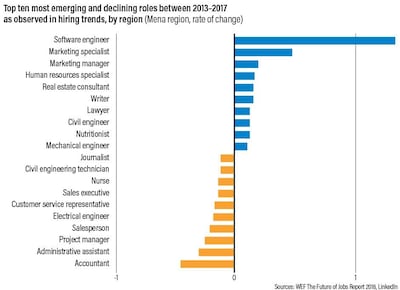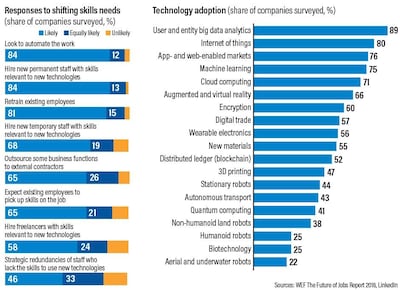Paolo Gallo, former chief human resources officer at the World Economic Forum, has witnessed the mega trends of the job market first hand.
When WEF opened the first Centre for the Fourth Industrial Revolution in San Francisco in 2017, Mr Gallo saw a clear dichotomy between job applicants with traditional expertise, such as finance, human resources and secretarial support, and those with new expertise, such as artificial intelligence, robotics, drones, blockchain, cyber security and the Internet of Things.
“For the first set of skills I had an oversupply of candidates and the average salary was $140,000 [Dh514,240] to $150,000 … which is actually not a lot of money if you’re in the Silicon Valley and you have 20 years of experience. But then for the new set of skills, I couldn’t get anybody coming for interviews if the salary wasn’t at least $300,000 for people with maximum four years’ experience,” says Mr Gallo, who was with WEF between 2014 and June of last year before leaving to become an executive coach.
The Fourth Industrial Revolution, a term first introduced by WEF executive chairman Klaus Schwab in a 2015 article in the magazine Foreign Affairs, is a new era characterised by technological advances in communication and connectivity. Mr Gallo, who has 30 years of experience in recruitment, says jobseekers worldwide need to be trained for the new skills of the future — or face being left behind.
“Right now in the US, there are nine million people unemployed and nine million jobs available, so you may think that this is a perfect situation … in reality 80 per cent of the people currently unemployed do not have the minimal skills to do the jobs of the future,” says Mr Gallo.
According to WEF's 2018 The Future of Jobs report, technological advances and new ways of working could displace 75 million jobs in 20 major world economies by 2022. At the same time, the large-scale growth of new products and services could create 133 million new roles for people trained to work with machines and algorithms.
"When there are discussions about jobs, you have a group of people who are optimistic who think a lot of jobs will be created. Then there are people who are pessimistic, who say 'let's be careful because a lot of jobs will be destroyed'," says Mr Gallo. "Both of them are right because jobs are being created and jobs have been destroyed."
An international speaker, author, adjunct professor and coach, Mr Gallo’s past roles have included chief learning officer at the World Bank and human resources director at the European Bank for Reconstruction and Development, as well as top advisory and recruitment positions at the International Finance Corporation and Citigroup.
He was in Dubai last month to speak at the Federal Authority for Government Human Resources conference on the human capital challenges of the Fourth Industrial Revolution.
The UAE has taken steps to prepare for the new era, appointing a Minister of State for Artificial Intelligence in 2017 and adopting the National Artificial Intelligence Strategy 2031 at a cabinet meeting last month. The strategy involves making artificial intelligence an integral part of business and government services, while training people to work with new technologies.
On April 28, artificial intelligence minister Omar Al Olama and WEF president Borge Brende launched a Centre for the Fourth Industrial Revolution in Dubai's Emirates Towers. The centre will act as a think tank to improve the governance of emerging technologies and co-ordinate with teams in similar centres in the US, Japan, China and India.
Mr Gallo says some countries, including the US, China, Japan and South Korea, are well into the revolution while others are lagging behind.
“We’ve already witnessed two waves of the Fourth Industrial Revolution. The first one is about internet, the second one is the use of data in organisations,” says Mr Gallo. “The next wave is coming now, which is what is called the OMO society — online merged with offline.”
World economies must prepare for the phase to follow of autonomous artificial intelligence, Mr Gallo says. “Fundamentally it’s when artificial intelligence — deep learning and these kinds of technologies — will take autonomous decisions without coding a programme to drive a certain outcome,” he explains. “Society has to be ready to tackle with this and jobs will be impacted.”
The jobs that will disappear are those that can easily be automated and where there is little human contact. Therefore, developing skills for the future not only means gaining proficiency in new technologies, but also placing greater emphasis on 'human' skills, such as creativity, collaboration and critical thinking, according to The Future of Jobs report.
Examples of roles that will be made redundant include data entry clerks, accountants, telemarketers and bank tellers. New roles include AI and machine learning specialists, data analysts and scientists, and e-commerce and social media specialists. To adapt to this new reality, Mr Gallo says “we need to re-educate individuals and … rethink the curriculums at schools and universities”.
“If you keep on training [people] for jobs that no longer exist, then we are producing something that the economy won’t need,” he adds.
In addition to looking at the big picture of the employment market, Mr Gallo advises people on how to find the right career path in his role as an executive coach and author of The Compass and the Radar: The Art of Building a Rewarding Career While Remaining True to Yourself, which has been published in 10 languages and was released in Arabic this year.
For the job market of the future, Mr Gallo says you need the radar to “decode the changes that are going to affect your work and your organisation” and the compass, which “can be summarised in five words: what do you stand for".
Mr Gallo says that a successful career cannot just be about salaries, promotions and climbing the corporate ladder. He recommends that people ask themselves three questions: am I learning something new? Am I helping other people? Do I love what I’m doing?
“Now with life expectancy increasing … if you don’t love what you’re doing [and] you’re just doing it to get a pay cheque at the end of the month, you’re not going to be able to play this game, because it’s too long,” says the 55-year-old. “You cannot pretend for 40 years.”
The combination of longer life expectancy rates and faster technological advances' acceleration rates means looking beyond traditional jobs and consideration factors. For employment seekers, it seems the Fourth Industrial Revolution has brought with it a moment of reckoning.







